Review: What to try first at Alhambra’s new Malaysian restaurant? Coffee and toast
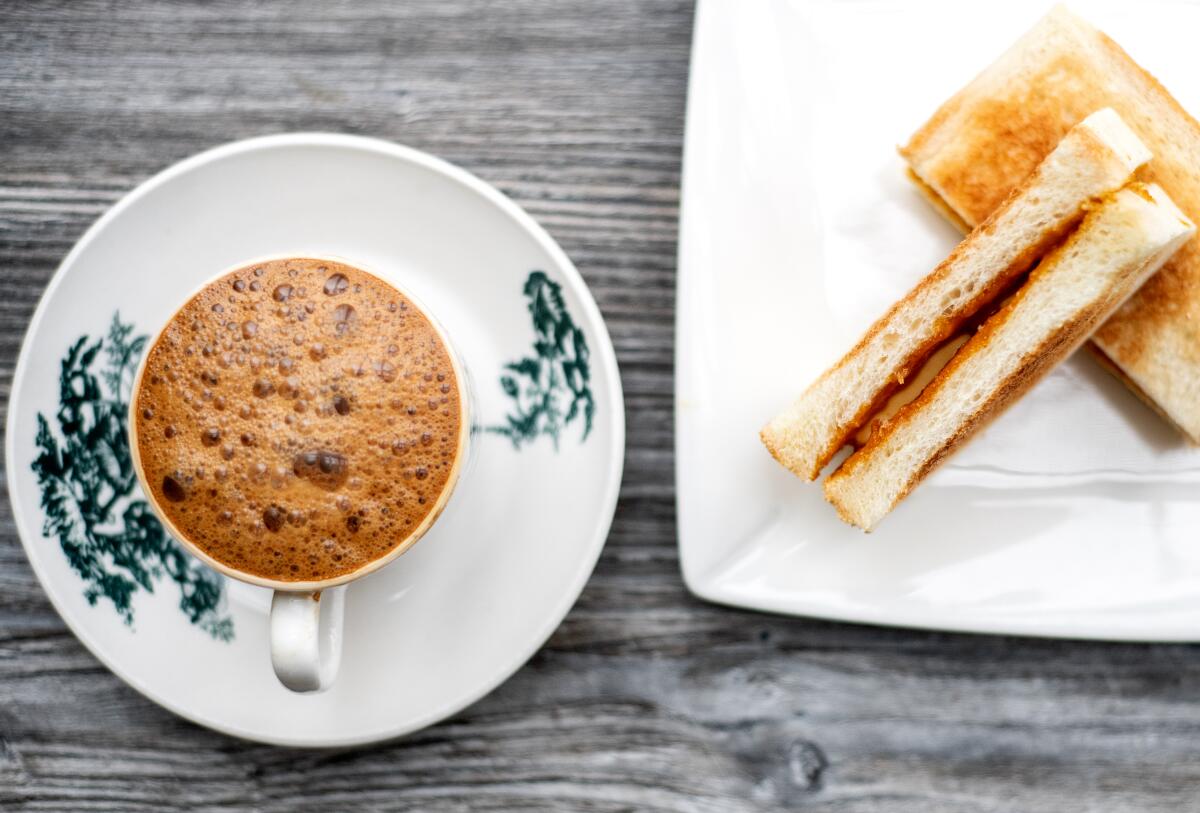
- Share via
The color of the Malaysian-style white coffee that Kenji Tang serves at his Alhambra restaurant, Ipoh Kopitiam, hews closer to milk chocolate than pure cream. Its taste hints of chocolate too, in the way that lightly roasted coffee can, though a smooth, layered caramel flavor strongly shades most sips.
Tang imports vacuum-packed, preground beans from Chang Jiang, a famous coffee brand in Ipoh, the city in northwestern Malaysia where he grew up. They’re roasted in margarine with sugar and salt, a mix that’s typical for creating the distinct sweetness of white coffee. To brew them, a staff member pours boiling water over the grounds in a sock-shaped cloth strainer that’s suspended over a tall metal pot. A swirl of evaporated milk lightens the bubbly froth that forms at the top of a full mug.
If you prefer an inky, more lightly sweetened caffeine fix in Ipoh (and at Ipoh Kopitiam), that’s the variation called black coffee, or kopi-o in Malay.
Slices of toast sandwiched with kaya (coconut jam) is a classic snack served alongside coffee. Tang and his team make the kaya, stirring and simmering coconut milk, egg, sugar and a few fragrant pandan leaves into a spread that’s slightly thicker than a pourable dulce de leche. Pats of fresh, cold butter, which your teeth slice into with satisfaction, add an optional (and recommended) third dimension to the sandwich.
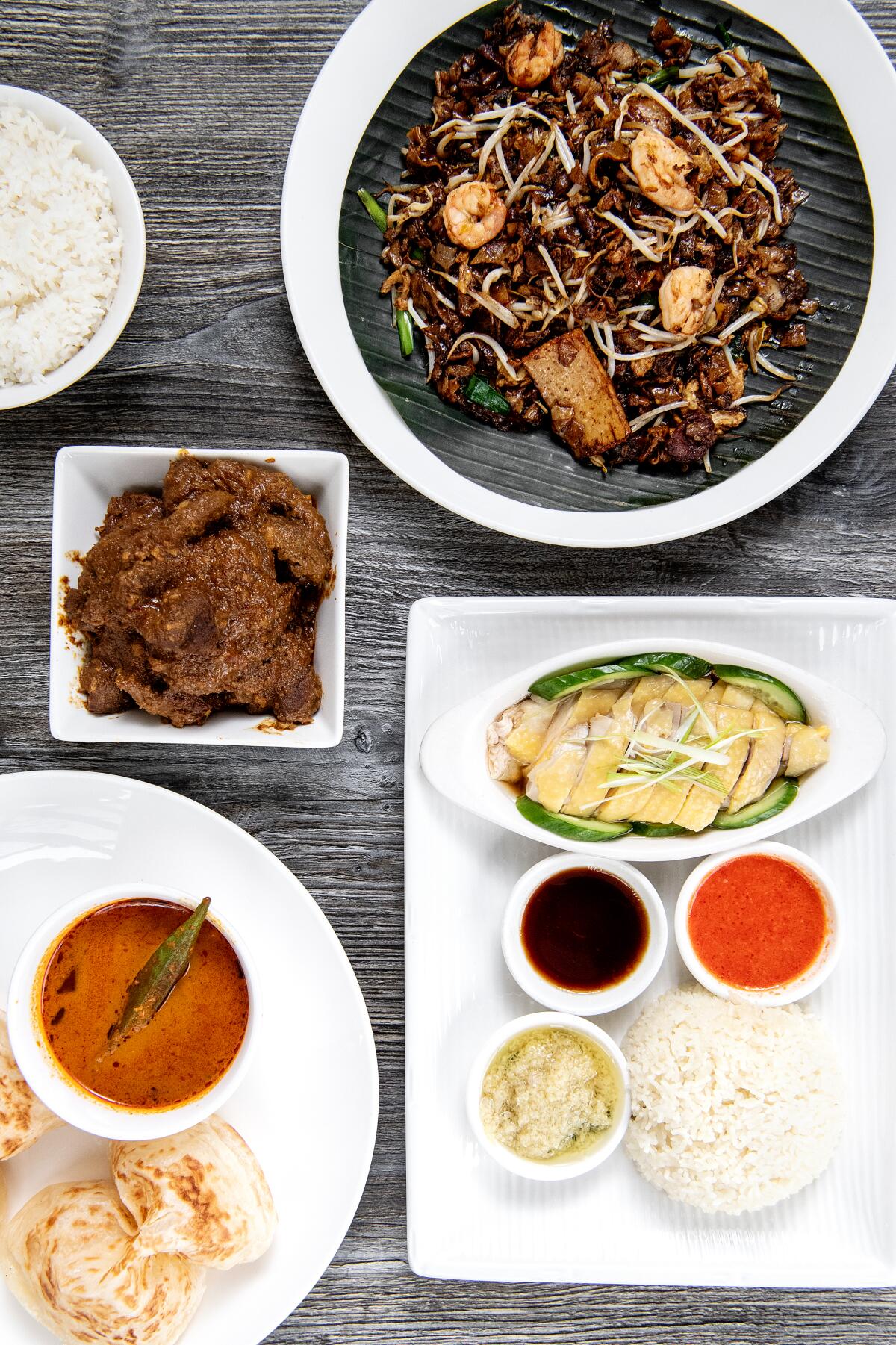
Tang’s menu covers a concise span of Malaysian curries, soups and rice and noodle dishes, but his attention to the sweet staples of his youth reveals the heart of his ambition. The word “kopitiam” translates as “coffee shop” in Ipoh’s polyglot vernacular. The city’s culture of coffeehouses — affordable hangouts serving sweet and savory snacks and sometimes beer — became entrenched in the late 19th and early 20th centuries, when the area was a center of tin mining under British colonial rule. Tang remembers kopitiams as laidback centers of community, a model he seeks to emulate in the San Gabriel Valley.
He was raised in a family of food industry professionals who ran hawker stalls and restaurants and also catered banquets, but he didn’t see the trade as his calling at first. He arrived in the United States two decades ago, working in wholesaling, focused on tech-enhanced home furnishings like massage chairs. When the pandemic toppled his career, he turned to the kitchen.
At first he was preparing food to give away, posting on a Facebook group for his Southeast Asian friends when he had portions of Hainan chicken rice to share. Someone finally said, “Why don’t you start selling it so we don’t feel embarrassed asking you to have some for free?”
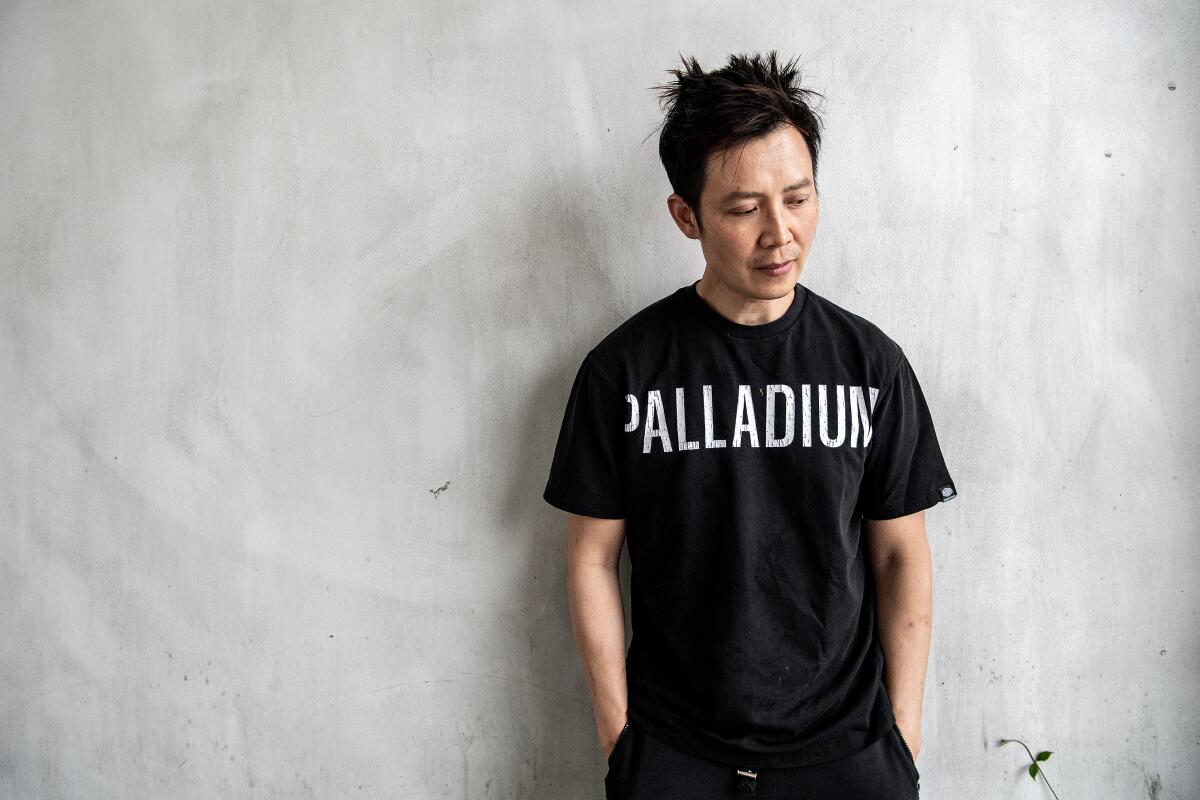
Tang ramped up his output of Hainan chicken rice and added other dishes, including laksa, chicken curry and a labor-intensive seafood curry. Sometimes he struggled to keep up with requests, but he felt fulfilled feeding people. During a hopeful moment in 2021, he reached out to the group and told them he was thinking about opening a restaurant serving the kinds of foods he’d been making through the shutdowns. Might anyone consider investing in his business?
More than 70 people responded yes. He chose three of them as silent partners.
Ipoh Kopitiam opened in early January in a small strip mall with ample underground parking near the hectic intersection of Valley Boulevard and South Garfield Avenue. The culinary riches of Los Angeles include surprisingly few Malaysian restaurants; word spread quickly about the new cafe and its true-minded cooking. Tang told me people are showing up whom he hasn’t seen since he first arrived in California 20 years ago.
The restaurant is open for lunch and dinner; noon or night you’ll probably want to start with roti canai. The cooks aren’t making flatbreads from scratch — it’s a small kitchen — but the ones they’re sourcing appeal with their elastic, buttery flakiness. More important, Tang and his crew painstakingly pound and blend different pastes for each of the curries, and the roti comes with a vegetarian coconut-laced dipping sauce that’s at once sharp and mellow. A lone okra pod drifts in the small bowl, absorbing the flavors of garlic and ginger and sweet, intense spices.
As when Tang was selling food from his home, the Singapore-style Hainan chicken rice is a beacon: It lands on nearly every table. This is one regional specialty you can find made by many hands around Southern California. If you’re a fan, you certainly should try the version at Ipoh Kopitiam. It is a study of subtleties: the poached bird, cut into tidy pieces; the precise mound of softly aromatic rice; and the placid sauces (mild chile and garlic-ginger are classics, and there’s also a dish of soy-based sauce on the plate).
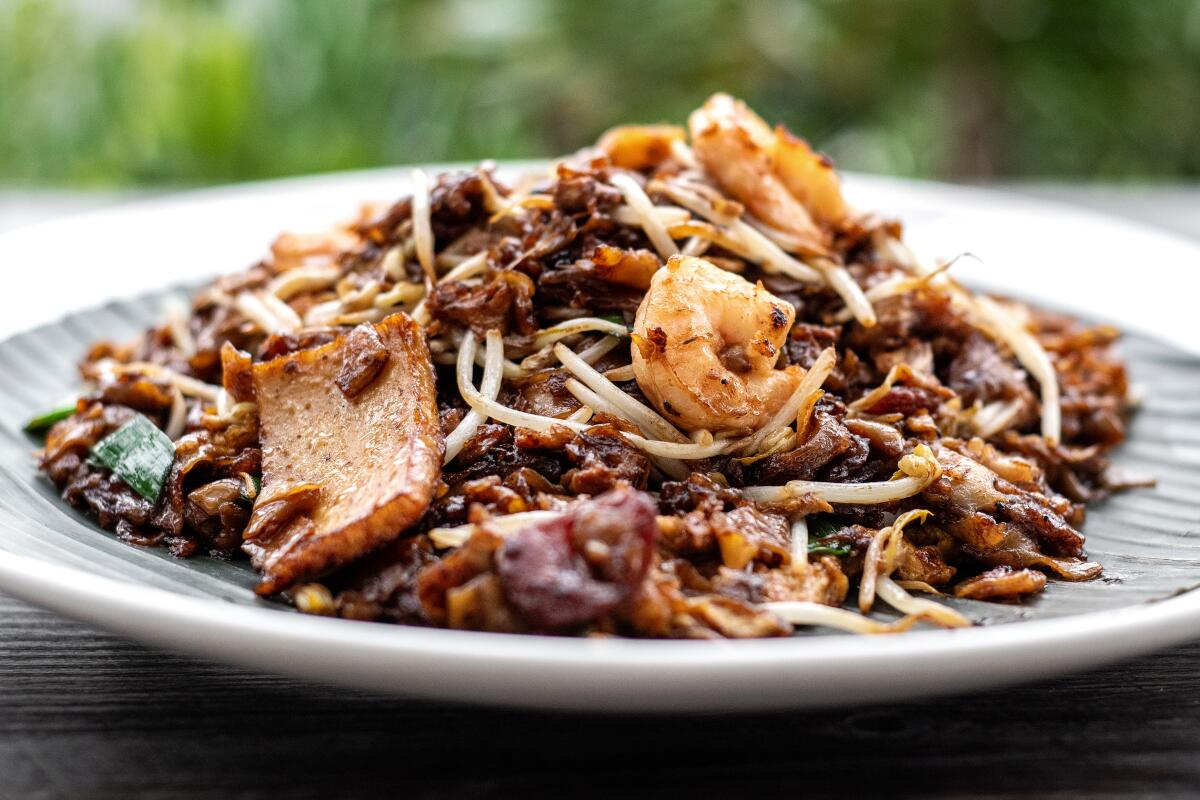
Honestly, other dishes more capture my devotion. One of them is bak kut teh, a pork rib and vegetable stew served in a clay pot with a tea-like broth steeped in herbs and spices. An earthy gust of ginseng threads among the scents of cinnamon and star anise. Customers would ask for this soup during the pandemic and I understand why: It goes down as a nourishing balm.
Char kway teow elicits an opposite, almost frantic reaction. Traditionally a popular street-food breakfast of flat rice noodles stir-fried with seafood and vegetables, this version arrives still heaving smoke from the wok: I inhale it fast while it’s almost too hot to eat, when the sprouts squiggling between the noodles are still crisp and the shrimp arranged on top retain their snap.
Curries show low-and-slow patience. I love the mulchy quality of the beef rendang, the way the chile hums through dense sauce, and how the minced shallots and lemongrass pierce through as both textures and flavors. Sometimes the hunks of meat arrive in small lobes, but it’s best when the batch has been cooked down so much that the beef is in shreds and you eat the dish partly with a fork and partly with a spoon, then mop up the rest with roti.
And the chicken curry, creamy in its combination of tomato paste and coconut milk, is anything but basic. Wrapping my head around its spice paste, I picture a cheerleading pyramid formation in which the ground coriander winds up on top. It’s rare that the dried seeds of the cilantro plant grab such a starring role to showcase their nutty-citrusy brightness. This dish makes the case.
Even better, order the chicken curry paired with nasi lemak — rice cooked in coconut milk with pandan leaves and served with boiled egg, a few slivers of anchovy and fiery sambal spiked with belacan (dried shrimp paste). It’s a plate of rousing contrasts: delicacy and potency, soothing textures mingling with complex, head-clearing tastes. Tang told me in an interview that getting the elements of the nasi lemak just right takes more work than any other dish he makes at the restaurant.
That said, I was at Ipoh Kopitiam at the end of one recent lunch service and noticed Tang sitting with his kitchen crew having a meal. It wasn’t nasi lemak he was consuming to recharge at the end of another busy afternoon. It was white coffee and kaya toast.
Ipoh Kopitiam
1411 S. Garfield Ave., Alhambra, (626) 703-4198, ipoh-kopitiam.com
Prices: toasts $3.50-$4.50; appetizers $3.95-$10.95; rice and noodle dishes $10.95-$17.95
Details: Open 11 a.m.-2:30 p.m. and 5-8:30 p.m. Thursday-Monday, 11 a.m.-2:30 p.m. Tuesday
Recommended dishes: white coffee, kaya toast with butter, beef rendang, chicken curry, bak kut teh, Hainan chicken rice
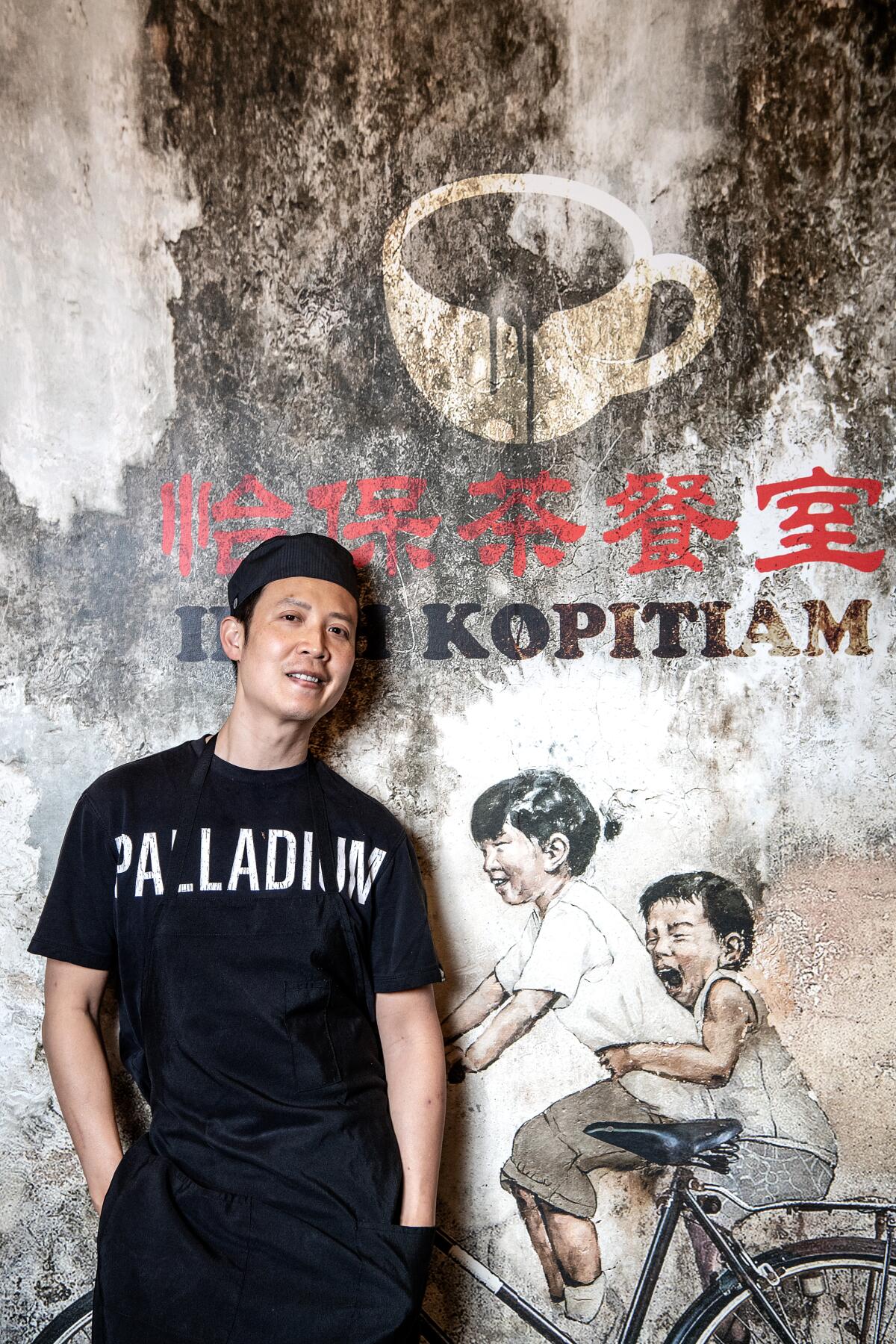
More to Read
Eat your way across L.A.
Get our weekly Tasting Notes newsletter for reviews, news and more.
You may occasionally receive promotional content from the Los Angeles Times.










